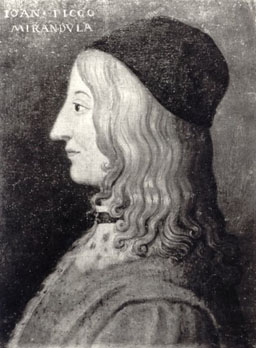| Giovanni Pico della Mirandola  AKA Giovanni Pico Pico della Mirandola AKA Giovanni Pico Pico della Mirandola
Born: 24-Feb-1463
Birthplace: Mirandola, Italy
Died: 17-Nov-1494
Location of death: Florence, Italy
Cause of death: unspecified
Gender: Male
Race or Ethnicity: White
Occupation: Philosopher Nationality: Italy
Executive summary: Italian philosopher and mystic Italian philosopher and writer, the youngest son of Giovanni Francesco Pico, prince of Mirandola, a small territory about 30 Italian miles west of Ferrara, afterwards absorbed in the Duchy of Modena, was born on the 24th of February 1463. The family was illustrious and wealthy, and claimed descent from Constantine the Great. In his fourteenth year Pico went to Bologna, where he studied for two years, and was much occupied with the Decretals. The traditional studies of the place, however, disgusted him; and he spent seven years wandering through all the schools of Italy and France and collecting a precious library. Besides Greek and Latin he knew Hebrew, Chaldee and Arabic; and his Hebrew teachers (Eliah del Medigo, Leo Abarbanel and Jochanan Alemansee) introduced him to the Kabbalah, which had great fascinations for one who loved all mystic and theosophic speculation. His learned wanderings ended (1486) at Rome, where he set forth for public disputation a list of nine hundred questions and conclusions in all branches of philosophy and theology. He remained a year in Rome, but the disputation he proposed was never held. The pope prohibited the little book in which they were contained, and Pico had to defend the impugned theses (De omni re scibili) in an elaborate Apologia. His personal orthodoxy was, however, subsequently vindicated by a brief of Alexander VI, dated 18th June 1493. The suspected theses included such points as the following: that Christ descended ad inferos not in His real presence but quoad effectum; that no image or cross should receive latreia even in the sense allowed by Thomas; that it is more reasonable to regard Origen as saved than as damned; that it is not in a man's free will to believe or disbelieve an article of faith as he pleases. But perhaps the most startling thesis was that no science gives surer conviction of the divinity of Christ than "magia" (i.e. the knowledge of the secrets of the heavenly bodies) and Kabbalah. Pico was the first to seek in the Kabbalah a proof of the Christian mysteries and it was by him that Johann Reuchlin was led into the same delusive path.
Pico had been up to this time a carefree Italian nobleman; he was tall, handsome, fair-complexioned, with keen grey eyes and yellow hair, and a great favorite with women. But his troubles led him to more serious thoughts; and he published, in his 28th year, the Heptaplus, a mystical exposition of the creation. Next he planned a great seven-fold work against the enemies of the Church, of which only the section directed against astrology was completed. After leaving Rome he again lived a wandering life, often visiting Florence, to which he was drawn by his friends Politian and Marsilius Ficinus, and where also he came under the influence of Girolamo Savonarola. It was at Florence that he died on the 17th of November 1494. Three years before his death he parted with his share of the ancestral principality, and designed, when certain literary plans were completed, to give away all he had and wander barefoot through the world preaching Christ. But these plans were cut short by a fever which carried him off just at the time when Charles VIII was at Florence.
Pico's works cannot now be read with much interest, but the man himself is still interesting, partly from his influence on Reuchlin and partly from the spectacle of a truly devout mind in the brilliant circle of half-pagan scholars of the Florentine renaissance.
Father: Giovanni Francesco Pico
Do you know something we don't?
Submit a correction or make a comment about this profile
Copyright ©2019 Soylent Communications
|